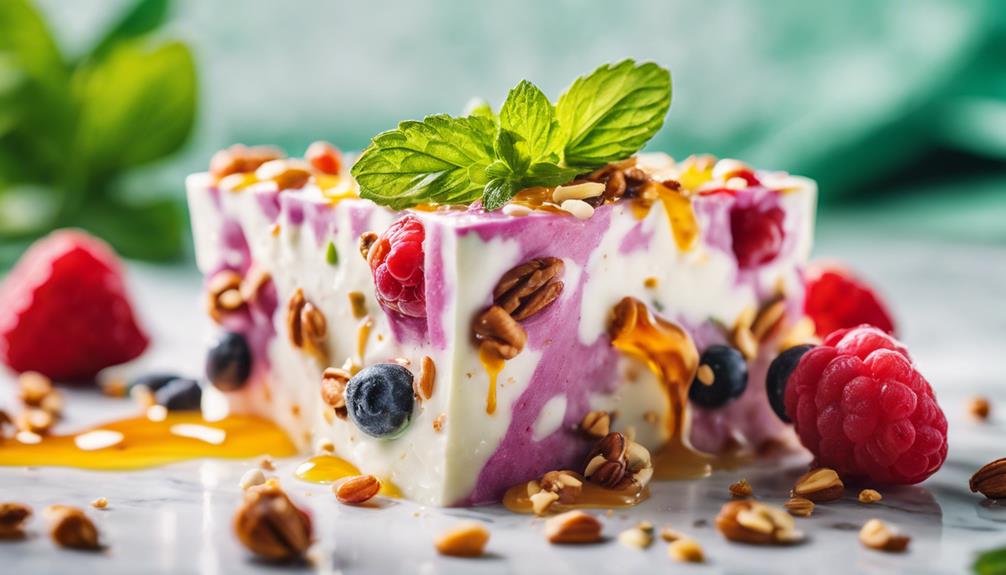Including ice cream in your balanced diet can be a tasty treat, providing essential nutrients like calcium and phosphorus. However, overindulgence can lead to excessive sugar and saturated fat intake, which increases health risks like obesity and diabetes. Moderation is key, and practicing portion control helps you enjoy ice cream without guilt. You can also enhance its nutritional value by adding fresh fruit or nuts. While ice cream has its place, consider healthier alternatives like low-fat yogurt for more benefits. Want to explore more about how to balance indulgence and nutrition? There's plenty more to discover! If you’re looking to enjoy ice cream in a healthier way, consider making your own at home with natural ingredients and less sugar. Additionally, consider taking up photographing ice cream tips for social media if you are a lover of frozen treats. By experimenting with different flavors and presentations, you can indulge in the enjoyment of ice cream while still being mindful of your overall health and wellness goals.
Key Takeaways
- Ice cream can provide essential nutrients like calcium and phosphorus, enhancing overall dietary enjoyment in moderation.
- Excessive consumption of ice cream may lead to high sugar and saturated fat intake, increasing health risks.
- Mindful consumption practices, such as portion control and adding nutrient-rich toppings, can promote a balanced diet.
- Healthier alternatives, like low-fat yogurt, offer lower sugar and higher protein, providing better nutritional benefits.
- Recent studies suggest that moderate ice cream intake may have a place in a balanced diet for certain health conditions.
Nutritional Benefits of Ice Cream

Ice cream can surprisingly offer some nutritional benefits when enjoyed in moderation. While it's often seen as a guilty pleasure, a typical 1/2-cup serving of regular ice cream provides about 140 calories and includes essential nutrients like calcium and phosphorus. You get around 10% and 6% of the Daily Value for these nutrients, respectively, which can support your bone health.
You might also find that ice cream contains small amounts of vitamins A and D, adding a bit more value to this tasty treat.
However, it's important to be mindful of portion sizes, especially with premium varieties that can pack in around 210 calories and 13 grams of fat per serving.
When you incorporate ice cream into your healthy diet, it can add enjoyment without completely derailing your nutritional goals. Small servings can fit well within your overall calorie intake, allowing you to indulge while still making room for healthier food choices.
Just remember, moderation is key—too much ice cream can lead to excess calories and displace more nutritious options in your diet. Enjoy it wisely, and you might just reap some unexpected benefits!
Health Risks of Excessive Intake

Overindulging in ice cream can lead to a range of health risks that you might not immediately consider. Consuming excessive amounts can spike your sugar intake, often surpassing the daily recommendation of 50g for a 2000-calorie diet. This high sugar consumption is linked to obesity, heart disease, and diabetes.
Additionally, regular servings of ice cream contain 12-24g of added sugars per 1/2-cup serving, contributing to potential blood sugar fluctuations. The saturated fat content can be as high as 13g per serving, which raises cholesterol levels and increases cardiovascular disease risk.
Frequent ice cream consumption can also crowd out healthier food choices, leading to nutrient deficiencies. Furthermore, many ice creams are laden with artificial additives that may trigger negative health effects, such as hyperactivity in children or digestive issues.
Here's a quick summary of the health risks:
| Health Risk | Description | Impact on Health |
|---|---|---|
| High Sugar Intake | Exceeds daily limit, linked to obesity | Diabetes, weight gain |
| Saturated Fat | Up to 13g per serving, raises cholesterol | Cardiovascular disease |
| Nutrient Deficiencies | Displaces healthier foods | Overall health decline |
| Artificial Additives | Linked to hyperactivity and digestive issues | Negative health effects |
| Blood Sugar Fluctuations | Caused by high sugar levels | Energy crashes |
Mindful Consumption Practices

Finding a balance in your diet can often feel challenging, especially when it comes to treats like ice cream. However, practicing mindful eating can transform the way you indulge. Start by employing portion control techniques; using pre-portioned products or small bowls can help you manage calorie intake and prevent overindulgence.
When you sit down to enjoy your ice cream, eliminate distractions and savor each bite. This practice enhances your enjoyment, allowing you to feel satisfied with smaller servings.
To further boost the nutritional value of your treat, consider adding nutrient-rich garnishes like fresh berries or nuts. These additions not only enhance flavor but also make your dessert more wholesome.
It's also vital to read labels for sugar and fat content, helping you make informed choices that align with your dietary goals.
Finally, set limits on how often you indulge in ice cream. By doing so, you encourage a balanced diet and guarantee healthier food choices aren't displaced.
Ice Cream vs. Healthier Alternatives

While indulging in ice cream can be a delightful experience, it's important to contemplate healthier alternatives that offer similar enjoyment with added nutritional benefits. Ice cream often contains high levels of added sugars, ranging between 12-24g per 1/2-cup serving, which can lead to health issues like obesity and diabetes.
In contrast, options like low-fat yogurt or plant-based gurt provide lower sugar content and higher protein levels, making them better choices for your health.
Healthier alternatives often come packed with additional benefits. For example, gurt contains live probiotics that support gut health, while ice cream lacks these microorganisms and can contribute to higher cholesterol due to its saturated fat content.
Nutrient-dense toppings such as fresh berries, nuts, and chia seeds can enhance ice cream's nutritional value, but they can't match the fiber and vitamins found in many healthier snacks.
Considering the rising popularity of plant-based gurt alternatives, you'll find many options that are lower in calories and richer in nutrients compared to traditional ice cream.
Ultimately, choosing healthier alternatives can help satisfy your cravings without compromising your health.
Recent Research on Health Claims

Recent studies on ice cream consumption have sparked interest in its potential health benefits, especially among individuals with specific dietary needs. A 2018 doctoral thesis revealed that consuming ice cream in moderation—specifically, less than or equal to two times per week—might lower the risk of cardiovascular disease by 12% among type 2 diabetes patients.
This finding came from an analysis of around 16,000 participants, suggesting that ice cream could have a place in a balanced diet.
However, it's important to highlight the observational nature of this study. While the results are promising, they don't establish a direct cause-and-effect relationship between ice cream consumption and heart health benefits.
In addition, other research warns that higher ice cream intake may be linked to risks of non-alcoholic fatty liver disease, and it doesn't provide the same health advantages as other dairy products like yogurt and cheese.
Frequently Asked Questions
Is Ice Cream Bad for You on a Diet?
Ice cream isn't inherently bad for you on a diet, but moderation's key. Enjoying small portions occasionally can satisfy cravings without derailing your progress. Just be mindful of your overall calorie and sugar intake.
Is Ice Cream Part of a Balanced Diet?
Yes, ice cream can be part of a balanced diet if you enjoy it in moderation. Just keep your portions small and combine it with healthier toppings to boost its nutritional value and maintain balance.
What Are the Benefits of Ice Cream?
Envision this: each spoonful of ice cream sends you soaring through clouds of joy! It boosts your calcium intake for strong bones, adds a sprinkle of vitamins, and even brightens your mood. Indulge wisely!
Is Ice Cream Junk Food or Healthy Food?
You might consider ice cream junk food due to its high sugar and fat content. However, in moderation, it can offer some enjoyment and even potential health benefits, especially when choosing healthier options or toppings.
Conclusion
Incorporating ice cream into your diet can be both a delightful treat and a potential pitfall. While it offers a dose of calcium and joy, overindulgence can lead to health issues. By practicing mindful consumption, you can savor its sweetness without sacrificing your well-being. Remember, enjoying ice cream in moderation reveals the balance between pleasure and health, reminding us that life's best moments often come from finding harmony between indulgence and responsibility.









